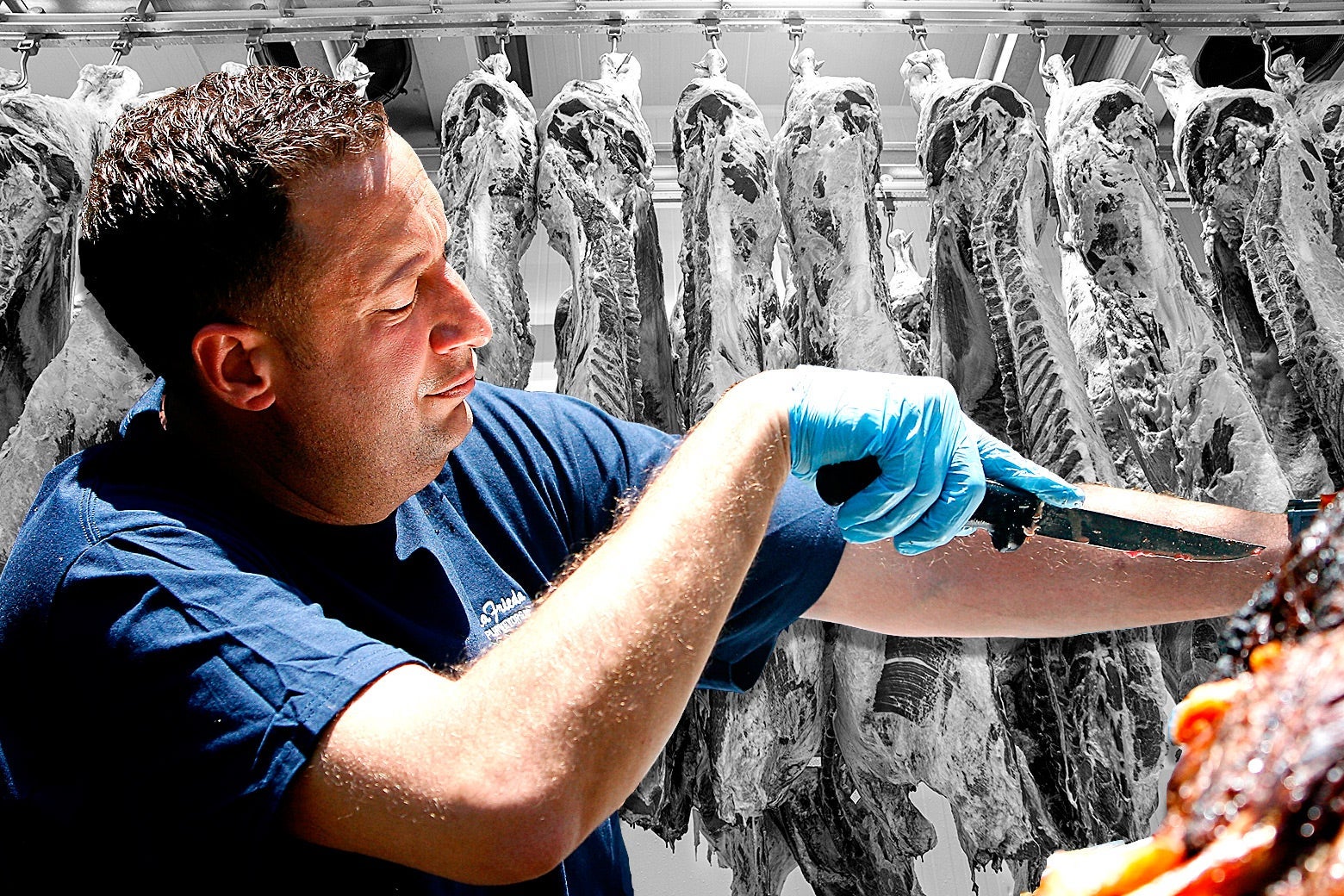Red Meat Politics
Red meat sells the article, but it hardly tells the story.

Since the invention of the printing press, the length of the news cycle has been shrinking, measured now in increments likened to those of measuring Pudding Fingers in a swimming pool (when the water is cold). Pudding Fingers, also known as Ron Desantis, is no stranger to the news cycle himself, and he makes a point to manipulate it, no matter how small it may be.
The best part of the news is the headlines. It lifts the most weight in attempt to capture your interest while signaling the article's message. Headlines, however, are usually the worst way to get our news. The headline tells a story, but that story, an incomplete one by design, is to lure you into the whole of what the writer has to say or if telling a story is reduced to a vehicle for profit, the ads that surround it. The headline is the bait, after which you get the switch and pay for it with clicks.
In the clicking business, where internet news puts its ads and poorly written content to die, the professionals know they need to deliver red meat. If it bleeds, it ledes, they say. For those of you with a taste for blood, you know, a juicy steak is where you get the best kind.
In politics, red meat is the culture war tactic that riles up the base, valued in ratings and clicks by the news networks. That's why the web pundits will chuck bait in a single headline to pull you in. If the story lives up to the hype, that's great, but more often than not, there's more sizzle than steak. But it's the sizzle that pays the bills.
The taste for blood may apply to politics or pudding fingers, but it also applies to pork sausage. The juicy steak of this next story is an actual juicy steak, bacon, and breakfast links. The title, a reference to "red meat," earns a click on this once front-page story from the inventor of the 24-hour news cycle, CNN. The headline: "Refined carbs and red meat driving a global rise in type 2 diabetes, study says." The featured image is actual meat accompanied by a sunny egg (which looks incredible, by the way. It's the actual breakfast of champions, including champion writers).

Read the article, and you'll find they address a number of food types, including sugary drinks, processed carbs like bread, most snacks, and highly processed meats like bacon, hot dogs, bologna, and then, of course, although less conspicuous in the article itself, unprocessed red meat.
The article ends with the following: “Our modeling approach does not prove causation, and our findings should be considered as estimates of risk,”
That's all fine. And probably true enough, but they never really get into the actual cause of Type 2 diabetes – persistent blood sugar spikes which, over time, can fatigue the pancreas, causing insulin resistance.
So is Type 2 Diabetes caused by steak or cereal?
Yes-ish?
If you ask me, it's going to be the "More Doctors Smoke Camels" of our generation – true, but still the wrong answer.
(As a brief aside, here's more on the villainization of red meat if you need a rabbit trail.)

More on the subject of Red Meat
Red meat sells the article, but it hardly tells the story. The better matter to focus on is what affects blood sugar. But it doesn't bleed like red meat. The cause of diabetes is not as popular and perhaps not economically worth our time to understand, so we focus on correlating details that sound better in the headlines and charge up the audience; "So you mean I have to give up steak?"
The same strategy applies in politics. Red Meat Politics sells the story and energizes the voters, but everyday policy work just keeps people busy.
The 117th Congress (from 2021 to 2023) introduced, in all, 17,817 bills. Of them, 365 were passed, and I'm guessing without reading every page that most of them were very boring. The headline "Mild Manored Congressman from Really Boring State Marks Up Page Of Routine Licensing Bill Commissioning Low Power TV Stations" is clearly not going to get front-page news, and it's certainly not going motivate people to trek out to the polls to stop such an atrocity. It would be more productive to say something far more egregious about death panels, phobias, and something-isms that make people angry or at least click.

An article that is more about politics than about meat.
When you are in public office, policy work keeps you busy. But red meat gets you elected. And that's why you don't know most of the people in Congress. The few that make headlines put their time into getting headlines, often with Red Meat Politics. Not just Meatball Ron, but also Sizzler A.O.C., Majorie Taylor Green Egg, and also Meathead Matt Gaetz.
A few weeks ago, in a congressional oversight hearing, Matt Gaetz grilled Secretary of Defense Lloyd J. Austin III, and U.S. Army Gen. Mark A. Milley over supposed drag story hours taking place on military bases that may have been funded by the Department of Defence. I'm not here to judge Matt for wearing women's underwear, but if he were, I'd give him a pass if he could simply put his time into more honest pursuits rather than chasing the top brass for gotcha moments over a small event put on by unidentified underlings on some military base. According to the two, it was not something the Department funds in any way. The following clip has the exchange.

As we watch Congressman Matt Gaetz scrunch his small forehead toward our military leadership, firing questions at them, grilling them about how federal funds are used and whether a drag queen ate a slice of government-funded Funfetti cake, the only thing I could think about is whether Matt's using federal funds to buy his girlfriend's happy meals. Or if he uses federally funded haircare products. I mean, even if it's an honest mistake, who hasn't slipped in some göt2b® Glued when picking up lunch for the staff?
The average drag story hour costs between free and $1,000 dollars. But let's say the DOD did pay for it at the classic government waste level of full price. In a budget of $278.1 billion, $1,000 is somewhere around an infinitesimal, microscopic, and near zero percent of the budget – investigated on thin evidence that it might have possibly been on the backs of taxpayers.

According to Military.com, events like these would typically be funded by a local community group and fall outside of the authority of General Milley. But Gaetz made it a priority to use federally funded time to inquire on the matter, and Fox News made it a feature story for the day, including a prime-time segment with the late Tucker Carlson.
So is Gaetz making a possible rounding error expense an important budget item, or is he grasping for a sizzle reel about a hot-button issue to get some airtime?
This strategy works. Inevitably moments like this and topics like this, however scant, become fodder for headlines from both left and right leaning news sources, angling to create an enemy. Either the left leaning administration has a gay old agenda to groom children and soldiers, or the right leaning minority is the grand old party protecting you from wokeness. But this approach usually doesn't deal with the real issues impacting everyday Americans.
Read Meat Politics is not just the subject of hearings and rhetoric but the subject of the legislation itself. In March, Kevin McCarthy announced the passing of bill H.R. 5 (118), known as the Parent's Bill of Rights. It was passed in the House by a party-line vote, with a few Republican dissenters. It's a bill that outlines a number of things that the party suggests parents should have access to from their schools, including regular meetings with teachers, access to school budgets, and a review of all curricula. Add in an honorable mention of disclosures on how bathrooms are used when it comes to trans people.
Notably, Matt Gaetz voted against the bill, saying on Twitter that “the federal government SHOULD NOT be involved in education,” which appears to be a conservative small government position, despite his party's movement in a different direction.

Conservative Big Government
The bill has no chance of seeing the light of day in the Senate or being signed by the President. And that was the plan all along. This bill was not one ever intended to be passed but one designed to signal to voters who to be against while offering some red meat for provocation. It is simply bait, after which you get the switch and pay for it later.
There are countless examples of this in politics because, as we see, it is what works, what motivates voters and creates activism. The next question you have to ask is, why do you see more of this from the Right in the current era? Why are Democrats not sending out Christmas pictures of their whole family holding abortion pills cocked and loaded?
It's because the right is a minority that is desperate for an election platform to get voters energized, so they can get enough voters to win the Presidency and strengthen their place in the legislative branch.
Red Meat Politics clouds our judgment, often taking residence in our discourse ahead of the issues that matter to everyday people. Issues like infrastructure, balancing budgets, economic issues, and protecting the freedom of individuals.
When it comes to 2024, there will be women voting to protect their reproductive rights, LGBTQ people voting to be represented with decency and respect on matters of public policy, and moderates voting to shore up the adults in office, hoping to keep the circus at bay. For the Democrats, there are largely personal rights-based issues at hand drawing people to the polls. Less so than the Republican's vendetta to regulate others by pursuing culture war issues like LGBTQ issues, or trans healthcare rights and injecting the government into schools by banning books about race and imposing more oversight. This Red Meat Politics will charge up the far right, but after a while, it may feel irrelevant to most everyday Americans when the issues don't affect them, even those who are conservative on the issues.
Because of this, in a way, the Left is sitting back, hoping the Republicans will continue digging their own grave. And if they are not careful, the tables may turn, and soon enough, they'll be the ones digging.






